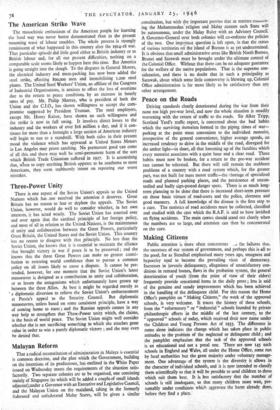Three-Power Unity
There is one aspect of the Soviet Union's appeals to the United Nations which has _not received the attention it deserves. Great Britain has no reason to fear or deplore the appeals. The Soviet Union, however, would do well to consider whether, in her own interests, it has acted wisely. The Soviet Union has asserted over and over again that the cardinal principle of her foreign policy, and most of all in relation to the United Nations, is the maintenance of unity and collaboration between the Great Powers, particularly Great Britain, the United States and the Soviet Union. This country has no reason to disagree with that piinciple. No less than the Soviet Union, she knows that it is essential to maintain the alliance that brought victory in war if peace is to be preserved ; and she knows that the three Great Powers can make no greater contri- bution to restoring world confidence than to pursue a common policy on all issues likely to cause a dispute. It cannot be pre- tended, however, for one moment that the Soviet Union's latest manoeuvre is designed as a contribution to unity and collaboration, or to lessen the antagonisms which unfortunately have grown up• between the three Allies. At best it might be regarded merely as a diplomatic diversion to relieve the Soviet Union's embarrassment at Persia's appeal to the Security Council. But diplomatic manoeuvres, unless based on some consistent principle, have a way of coming home to roost ; and the Russian appeals cannot in any way help to strengthen that Three-Power unity which, she claims, is the basis of world peace. The Soviet Union might well consider whether she is not sacrificing something to which she attaches great value in order to win a purely diplomatic victory ; and she may even be denied that.






























 Previous page
Previous page